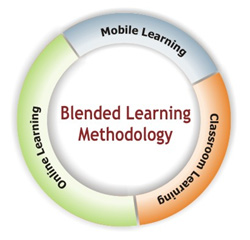2013 Higher Education Trends: Blended Learning
Much of the recent discussion about technology in higher education has centered on MOOCs. Here at the Bunker Blog, we’ve featured two MOOC posts this year. (You can read them here and here.) But one reality that shouldn’t get lost in all of the hype is the fact that MOOCs represent only one of several types of online learning that happen at the college level. There are, of course, purely online classes that are not MOOCs. It’s also worth noting that many so-called traditional face-to-face courses are actually “web-enhanced,” meaning that, although the primary means of instruction is classroom learning, varying degrees of material or class interaction occurs through an online format, usually a Learning Management System.
Still another format is the blended or hybrid course, where classroom time is reduced (it’s often about half that of a traditional course) and supplemented by a significant online component. There is some reason to believe that blended learning may ultimately be closer than MOOCs or other pure online approaches to the model that higher education evolves toward in the future.

A body of research suggests that blended learning might really represent the best of both worlds. A Meta-Analysis published by the U.S. Department of Education in 2010 reported that blended approaches were more effective than traditional face-to-face or pure online approaches in terms of learning outcomes for college undergraduate and older students. Even some providers of MOOCs, in recognition of some of the shortcomings of that format, have begun experimenting with blended MOOC approaches.
Blended learning isn’t limited to just the college level. It also encompasses areas such as corporate training and K-12 education. A recent piece in Smithsonian Magazine focuses on the success of blended learning at the elementary school level. That article contains a passage that serves as a useful insight into the philosophy of the blended approach at any educational level:
“….To understand blended learning, it’s crucial to understand what it’s not: doing online worksheets, reading digital prompts or any other technology-related activity aren’t examples of blended learning unless they allow a student some control over the pace and content of the instruction.”[Bold emphasis is ours.]
Research done here at RMS suggests that blended learning is a popular approach with prospective college students. We have done several qualitative higher education studies where the findings suggested that adult learners preferred blended learning to both traditional classroom and pure online instruction. This finding was decisively confirmed by a panel survey we conducted in 2012 in which hybrid courses were the preferred format for 55% of respondents.
Given the effectiveness, popularity and perhaps most of all, the flexibility of blended learning, the approach will likely grow in the foreseeable future. It would seem to offer the accessibility that students increasingly demand without sacrificing the face-to-face interaction with faculty and fellow students that so many people believe is the essence of higher education. As institutions grapple with the best ways to adapt technological innovations to instruction, the little-hyped blended format may ultimately prove to be the best solution.
If you currently work at a college or university, give Research & Marketing Strategies (RMS) a call to discuss our range of data-driven marketing and research solutions for higher education. Please contact our Business Development Director Sandy Baker, at SandyB@RMSresults.com or by calling (315) 635-9802.
[…] Much of the recent discussion about technology in higher education has centered on MOOCs. Here at the Bunker Blog, we’ve featured two MOOC posts this year. (You can read them here and here.) But o… […]
[…] Much of the recent discussion about technology in higher education has centered on MOOCs. Here at the Bunker Blog, we've featured two MOOC posts this year. (You can read them here and here.) But one reality that … […]
[…] you a college or school district interested in conducting an online graduate survey to obtain feedback from former attendees? Contact our Business Development Director Sandy Baker, at […]